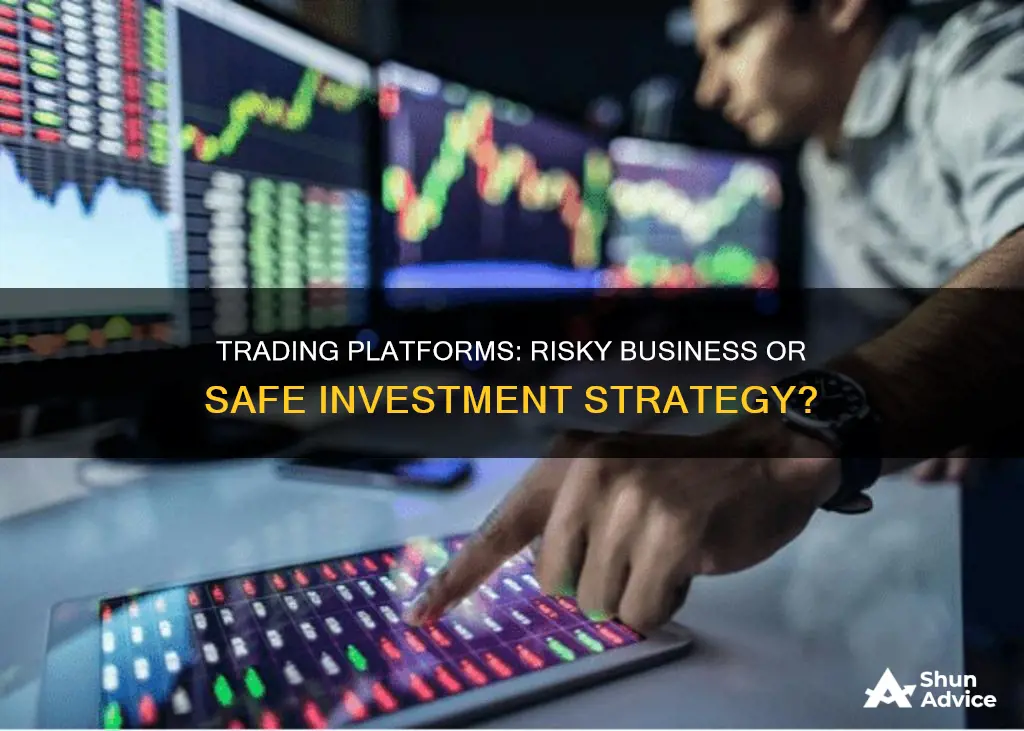
Trading platforms are software systems that allow investors to place trades and monitor their accounts. They have gained popularity due to their potential to offer lower fees, increased accessibility, and convenience. However, it is essential to understand the risks associated with these platforms. Online trading platforms may pose risks such as cybersecurity threats, including impostor apps, phishing attacks, and data breaches. Additionally, investors relying solely on their knowledge and platform information may not fully grasp the nature and risks of investment products. The accuracy and reliability of information available online cannot always be guaranteed, and system errors during high market volatility can result in critical market access loss. To mitigate these risks, investors should educate themselves about online investment platforms and implement cybersecurity measures to protect their interests and data.
| Characteristics | Values |
|---|---|
| Fees | Lower fees than traditional brokerages |
| Accessibility | Increased accessibility and convenience |
| Security | Risk of cyber-attacks, including impostor apps, phishing attacks, and malware |
| Privacy | Potential privacy issues, such as leakage of private information and unauthorised use of customer data |
| System errors | System errors may occur during high market volatility, causing loss of critical market access and trading opportunities |
| Information accuracy | Information accuracy and reliability cannot be guaranteed |
| Investment advice | Access to investment advice and news |
| Automation | Automation may minimise human error |
| Investor knowledge | Potential knowledge gap for investors |
What You'll Learn
- Potential knowledge gap: Investors may not fully understand the nature and risks of an investment product
- Security threats: Hackers may breach security measures and compromise your account
- Privacy issues: Leakage of private information and unauthorised use of customer data may occur
- System errors: Investors may lose critical market access and trading opportunities
- Platform reliability: Platforms may crash or freeze during times of global economic events

Potential knowledge gap: Investors may not fully understand the nature and risks of an investment product
Trading platforms have become increasingly popular, especially with the rise of digital banking and payment services. However, investors should be aware of the potential risks involved when using these platforms. One of the main risks is the potential knowledge gap between investors and the investment products they are considering.
When trading online, investors rely heavily on their own knowledge and experience, as well as the information provided by the platform. The lack of interaction with a financial advisor means that investors may not fully understand the nature and risks of the investment products they are considering. While online platforms provide easy access to financial information, the accuracy and reliability of this information cannot always be guaranteed.
For example, an investor may not understand the complex nature of certain investment products, such as options contracts, which can be risky if used for speculation or selling insurance to hedgers. Additionally, investors may not be aware of the potential risks associated with different types of investments, such as market risk, business risk, political risk, and currency risk.
To address this knowledge gap, investors should seek out reliable sources of information and conduct thorough research before making any investment decisions. They should also consider consulting with a financial advisor to ensure they fully understand the risks involved. It is important for investors to be cautious and well-informed to make informed decisions that align with their financial goals and risk tolerance.
Universal Life Insurance: Smart Investment or Risky Move?
You may want to see also

Security threats: Hackers may breach security measures and compromise your account
Security threats are a significant concern for online trading platforms, and hackers breaching security measures is a constant risk. In recent years, there has been a rise in cyber-attacks targeting clients of brokers, with phishing attempts being the most common method.
Hackers employ various tactics to gain access to users' devices and accounts. One common tactic is spear phishing, where hackers send emails that appear legitimate to trick users into clicking malicious links or providing sensitive information. Another tactic is client-side attacks, where hackers target users' devices directly, either through malware or by physically accessing an unlocked device.
To protect against these threats, it is recommended that users enable two-factor authentication (2FA) for critical operations and use strong, unique passwords for their trading accounts. Additionally, users should avoid public Wi-Fi networks and enable automatic logout after a period of inactivity.
While some platforms have implemented stronger security measures, such as 2FA and stronger password policies, it is crucial for both users and platforms to remain vigilant and proactive in safeguarding accounts and personal information.
A Beginner's Guide to Using Folio Investing
You may want to see also

Privacy issues: Leakage of private information and unauthorised use of customer data may occur
Trading platforms have been under scrutiny for security and privacy issues, with researchers unearthing a long list of vulnerabilities that may expose users to risks.
One of the main privacy issues is the leakage of private information and the unauthorised use of customer data. Many platforms store trading-related data unencrypted, meaning that if an attacker gains access to a user's device, for example, through malware, that data can be easily extracted. This is a significant risk, as it could lead to identity theft, financial loss, or other malicious activities.
Additionally, while modern mobile operating systems encrypt data by default, if an unauthorised user gains access to an unlocked phone, they can also steal the data. This also applies to computers or unencrypted backups.
To mitigate these risks, users should take precautions such as enabling two-factor authentication, using strong passwords, avoiding public Wi-Fi networks, and regularly updating their devices and operating systems.
It is also important for trading platforms to implement stronger security measures, such as stronger password policies, two-factor authentication, and opt-in notifications for various activities. Regular security updates and patches are essential to addressing newly discovered vulnerabilities and protecting user data.
Corporate Cash Investment Strategies: Maximizing Returns, Minimizing Risk
You may want to see also

System errors: Investors may lose critical market access and trading opportunities
System errors are an inherent risk of using online investment platforms. If a system error occurs, investors may lose critical market access and trading opportunities, especially during high market volatility and around market opening and closing.
In recent years, there has been a rise in the number of trading venues, with equity trading occurring across 13 national securities exchanges and more than 40 dark pools. This fragmentation of trading volume, coupled with the reliance on automated systems, has increased the potential for system failures to spread quickly and affect the entire market. System-wide problems have already impacted capital markets, causing investors to lose confidence and pull billions of dollars from mutual funds investing in U.S. stocks.
To mitigate the risk of system errors, regulatory bodies like the U.S. Securities and Exchange Commission (SEC) have adopted measures such as single-stock circuit breakers, the ban on stub quotes, and rules requiring pre-trade risk controls. Additionally, the SEC is working on extending its Automation Review Policy (ARP) to include alternative trading systems, plan processors, and clearing agencies.
While these measures provide some protection, investors can also take steps to safeguard their interests. This includes learning more about online investment platforms, enabling two-factor authentication, using strong passwords, and avoiding public Wi-Fi networks when conducting trades. By combining regulatory oversight with individual precautions, the risk of system errors disrupting critical market access and trading opportunities can be reduced.
Understanding Cash Flows from Investing Activities
You may want to see also

Platform reliability: Platforms may crash or freeze during times of global economic events
Platform Reliability
Trading platforms may crash or freeze during times of global economic events, and this is an important consideration when assessing the risks of investing using a trading platform.
System errors can occur, particularly during high market volatility and around market opening and closing times. This can cause investors to lose critical market access and miss out on trading opportunities. For example, during the 2020 stock market crash, the drop in stock prices was so sudden and dramatic that a Level 1 market-wide circuit breaker was issued at 9:30 am on March 16th, and NYSE trading was suspended several times.
In addition, the increased usage of trading apps during the COVID-19 pandemic threw a spotlight on the cybersecurity of these platforms. While not necessarily insecure, many platforms are not as secure as banking apps, and may store trading-related data unencrypted. This means that if an attacker gains access to your device, that data could be easily extracted.
To avoid these issues, investors should take steps to protect their interests, such as learning more about online investment platforms and implementing security measures like two-factor authentication.
Creating Cash Flow: Investment Strategies for Success
You may want to see also







